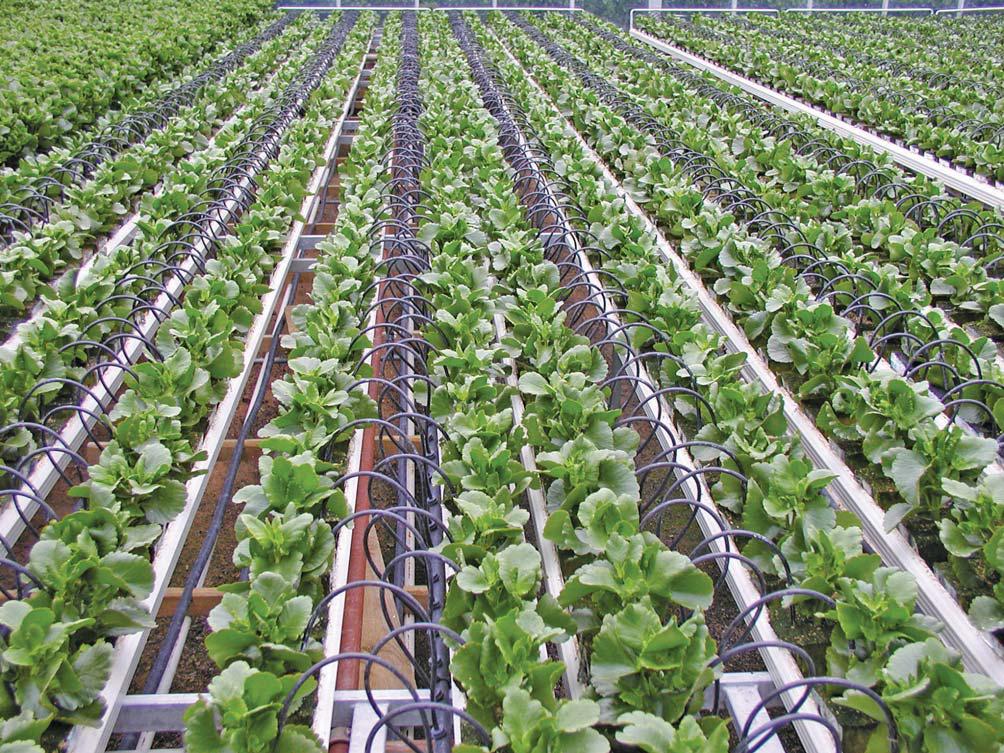
Irrigation technology is expanding rapidly, as computer learning and remote monitoring become more advanced. The technology aims to improve yields, while lowering production costs and minimising the environmental impact of production. Some of the technologies are discussed below.
• Drip irrigation
This technology, developed in Israel around 1959, enables a precise amount of water and nutrients to be delivered directly to the plant, reducing water waste and improving crop yield.
A recent development is the use of sensors and artificial intelligence (AI) to optimise water delivery. Netafim, for example, a leader in drip irrigation technology, offers solutions that use soil moisture sensors and weather data to automatically adjust water delivery based on crop needs, soil conditions, and weather patterns.
Micro-irrigation technology is another advance in drip irrigation. This involves the use of very small emitters that deliver water directly to the root zone of plants. Companies such as Jain Irrigation Systems offer micro-irrigation solutions specifically designed for high-value crops such as fruits, vegetables, and flowers.
Another company specialising in drip irrigation is Rivulis Irrigation, which has developed products that use recycled materials and minimise the amount of water needed for irrigation. The company's Eco-Drip system is made from recycled plastic and delivers water to crops at a rate of only around 20/hour.
• Smart irrigation
この記事は Farmer's Weekly の March 31, 2023 版に掲載されています。
7 日間の Magzter GOLD 無料トライアルを開始して、何千もの厳選されたプレミアム ストーリー、9,000 以上の雑誌や新聞にアクセスしてください。
すでに購読者です ? サインイン
この記事は Farmer's Weekly の March 31, 2023 版に掲載されています。
7 日間の Magzter GOLD 無料トライアルを開始して、何千もの厳選されたプレミアム ストーリー、9,000 以上の雑誌や新聞にアクセスしてください。
すでに購読者です? サインイン

ARC names best dairy producers of the year
The Agricultural Research Council (ARC) recently announced the winners of the 2024 National Master Dairyman Awards at an event hosted by AgriExpo in Stellenbosch, Western Cape.

Lion breeders to give up bone stockpiles?
The Ministry of Forestry, Fisheries and the Environment issued an official notice in mid-November in which it called on lion breeders to voluntarily hand over their lion bone stockpiles to the state as soon as possible.

Thousands of British farmers march on parliament against inheritance tax
Thousands of UK farmers gathered in London, England, on 19 November to demand the government repeal a proposed inheritance tax on agricultural land, which they argued threatened the future of family-run farms (see page 4), Al Jazeera reported.

Avocado frittata with sundried tomatoes, feta and olives
This wholesome, vibrant frittata is perfect for brunch or a light supper. Recipe and photo: The South African Avocado Growers' Association.

Feed, hay, and other costs are up, so it's time to get creative
Breeders and riding schools need to explore innovative ways to generate income in order to ensure their survival, says Dr Mac.

How to make polystyrene seedling trays last longer
While thinking about how to prolong the lifespan of polystyrene seedling trays that are exposed to harsh sunlight, Bill Kerr began to wonder if a coat of paint might offer a solution.

Living the 'culture' in agriculture
Creation Wines has won numerous awards, was ranked fourth in the World’s Best Vineyards in 2023, and more recently won the V d’Or award for the Best Brand Experience. The owners, Carolyn and Jean-Claude Martin, spoke to Glenneis Kriel about how their winery became a top tourism destination.

Time to take a deep breath on the slopes of the Magaliesberg
Around 100km from both Johannesburg and Pretoria in Gauteng and a tad over 40km from Rustenburg in North West, Farmer’s Weekly found a fine retreat on a working farm where couples may kindle their romance.

African penguins could be extinct by 2035 how to save them
Protecting the critically endangered African penguin is good for the environment, other animal species, and the economy, say Lorien Pichegru and Dr Alistair McInnes of Nelson Mandela University, Katrin Ludynia of the University of Cape Town, and Peter Barham of the University of Bristol in the UK.

An urgent need to confront Nassella in SA
South American grass species from the genus Nassella were unwittingly introduced to South Africa over 120 years ago and continue to invade montane veld. As Mike Burgess writes, research-based action is required.